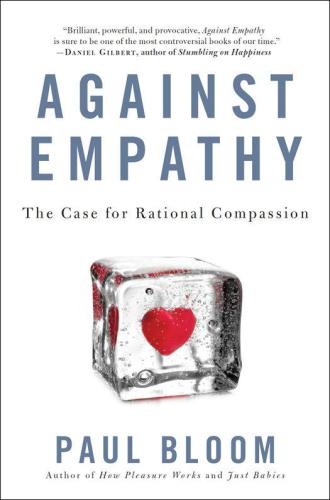
Against Empathy
The Case for Rational Compassion
کتاب های مرتبط
- اطلاعات
- نقد و بررسی
- دیدگاه کاربران
نقد و بررسی

September 19, 2016
Psychologist Bloom (Just Babies) makes the provocative argument that empathy is not the vital catalyst for human morality it is thought to be, and that the impulse toward empathetic feelings should, in fact, be suppressed. The argument centers on empathetic bias, where people favor those they can more easily relate to, which in Bloom’s analysis leads to “parochialism and racism.” Furthermore, empathy often gets hijacked by individual political
persuasions, and its “spotlight” focus can bypass rational thought, ignoring important context. Bloom takes aim at scientific claims about “mirror neurons” supposedly linked to empathetic thought, and at the use of empathy-measuring scales in
laboratory settings. He also points out the misery that occurs for those who experience empathy too deeply. Bloom’s solution is a morality based on “self-control,” “intelligence,” and “diffuse compassion,” an innate kindness that exists in people
independent of empathy. Not surprisingly, his prescriptions don’t quite convince. His political arguments are obtuse. His assertion that moral feelings about issues like global warming exist without
immediate victims to empathize with is only true if one does not take into account caring for one’s children’s futures. Still, there is something here. While Bloom may not entirely vanquish empathy, he makes a powerful appeal for a more reasonable and responsible deployment of it. Agent: Katinka Matson, Brockman.

October 15, 2016
The potential of empathy to lead to cruelty prompts Bloom (Psychology/Yale Univ.; Just Babies: The Origins of Good and Evil, 2013, etc.) to promote the function of compassion, which is informed by rational deliberation.The author distinguishes between sentimental and cognitive empathy. Without the reasoning power of the latter, impulsiveness is subject to self-deception and manipulation. Sentimental empathy is narrow, Bloom writes, "like a spotlight," introducing bias, distortion, and/or worse. Most people are unable to truly empathize with more than one or two others at a time. Cognitive empathy enables the understanding of "what's going on in other people's heads." A single case--e.g., the 2012 school shooting in Newtown, Connecticut--evokes a much stronger response than the daily murders of teenagers in inner cities around the country. We should empathize with all these people, and the billions more around the world in need, "but we can't." As the author shows, we need our cognitive capabilities to truly value their lives. Bloom's argument takes in many elements of modern neuroscience and psychology in distinguishing among various mental frameworks. Neuroscience has also been used to test how empathy can distort our responses and judgments. For example, we react differently when asked to think "objectively" or from the standpoint of our feelings in considering whether terminally ill children should be moved up a waiting list for treatment or not. In this situation, by ignoring the whole picture, empathy may be both cruel and unjust. Thankfully, "we can engage in reasoning, including moral reasoning, that is more abstract." While reason can be subject to bias and distortion, as well, we still shouldn't belittle our rational capabilities as impotent or insignificant. People, writes Bloom, are "not as stupid as many scholars think we are."An intriguing counterattack to modern psychological cynicism.
COPYRIGHT(2016) Kirkus Reviews, ALL RIGHTS RESERVED.

October 15, 2016
Bloom (Brooks & Suzanne Ragen Professor of Psychology & Cognitive Science, Yale Univ.; Just Babies: The Origins of Good and Evil) continues his investigations into the nature of morality. In first focusing on the definition of empathy as a narrow personal and emotional response, a "spotlight" effect results, which makes the qualities of empathy less effective in creating change than other human qualities. Bloom maintains that instead of requiring empathy in both national policy and personal decisions, an Enlightenment view would be much more effective. Invoking Adam Smith and the Dalai Lama, he emphasizes that the human capacity for self-control, intelligence, and compassion are much better internal guides for people and groups than mere empathy. Feeling empathy, Bloom suggests, does not help us learn to assess critically our own limitations in order to make the best decisions. VERDICT This refreshing, well-structured polemic against fatuousness and sloppy thinking is recommended for advanced general and social sciences readers.--Kellie Benson, Oakton Community Coll. Libs., Des Plaines, IL
Copyright 2016 Library Journal, LLC Used with permission.

























دیدگاه کاربران